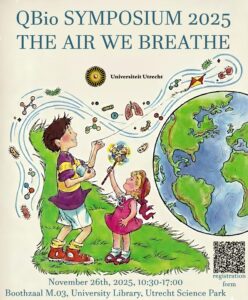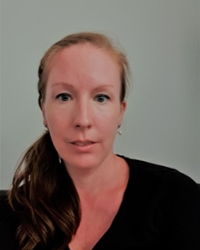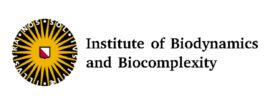QBio Symposium 2025
“The Air We Breathe”
This symposium is organized as part of the QBio honours master program. The aim of the program is to bring toge
ther master students following programs in Natural Science and Health and Life Science.
In this yearly symposium, part of the Quantitative Biology (QBio) Honours Programme, we explore a subject from the point of view of multiple research disciplines. In particular, there is an emphasis on life sciences & natural sciences.
This year, we’ll explore something we rarely stop to think about, but all depend on: the air we breathe! We’ll discuss everything from its role in the spread of disease to the part it plays in climate change.
Registrations are open!

| Schedule | |
|---|---|
| 10:30 | Room open |
| 10:50 | Introduction |
| 11:00 | The One Health Dynamics of Airborne Pathogens: linking Humans, Animals and the Environment – Dr. Myrna de Rooij |
| Abstract:
“Airborne zoonotic transmission is an increasingly recognised One Health challenge, linking animal, environmental, and human health through ‘the air we all breathe’. This presentation will introduce key mechanisms by which pathogens can spread from animals to humans through the environment. We will dive into real-world examples, including outbreaks where airborne transmission played a critical role. Attention will be given to how human behaviour, agricultural systems, and surrounding environmental conditions modulate the risk of transmission. The session will illustrate how integrated One Health approaches can reduce the risk and impact of airborne zoonoses.” |
|
| 11:45 |
How ‘Bog Breathing’ changes our life – Dr. Janna Barel |
| Abstract
“Peatlands are wet, land-bound ecosystems with a renowned capacity to store carbon. These wetlands not only support a unique biodiversity, they breathe. In this talk we’ll explore how interactions between plants, and the peat soil microbial community help maintain Earth within its planetary boundaries.” |
|
| 12:30 | Lunch |
| 13:15 | Montreal Protocol: Ozone layer protection and climate change – Prof. dr. Guus Velders |
| Abstract:
“I never hear about the ozone hole anymore, isn’t it solved? This is a question I hear often. In my presentation I will explain what causes depletion of the ozone layer, how the Montreal Protocol was designed, what the world would have looked like without the protocol, what the current status of the ozone hole is and how protection of the ozone layer is also helping to fight climate change. I will discuss how various groups of people, policymakers, scientist, industry and consumers, played a role in this.” |
|
| 14:00 | Healthy soil = healthy ecosystem? – Dr. Emilia Hannula |
| Abstract:
“Soils are the basis of many ecosystem functions such as carbon and nutrient cycling, water purification, and food production. However, they are often seen only as ‘dirt’ and ignored by people and policy makers. In this talk I will discuss the ways soils are linked to human health (through air quality and food) and how they as largest terrestrial carbon sinks, regulate carbon cycling, and in this way affect climate. I will further highlight the need of interdisciplinary connections to solve big societal issues and talk about our ongoing interdisciplinary projects to link soils to gut health and policy (Soils2Guts) and to understand and steer soil carbon storage across Dutch land uses.” |
|
| 14:45 | Break (Coffee/Tea) |
| 15:15 | – Dr. Jelte van der Vaart |
| Abstract:
“Airway organoids provide a powerful system to investigate human respiratory biology in a controlled setting. These epithelial structures reproduce many aspects of airway organisation and function, which enables detailed study of host pathogen interactions and the consequences of inherited defects. Many studies have shown that airway organoids support infection by respiratory viruses, including SARS-CoV-2 and respiratory syncytial virus (RSV) among others, which allows analysis of viral entry routes, cell tropism and epithelial responses. They have also advanced the understanding of genetic airway disorders by offering functional readouts of ciliary activity, mucus handling and epithelial renewal. Together, these applications illustrate how airway organoids can bridge fundamental mechanisms and translational questions in respiratory research.” |
|
| 16:00 | Clouds – Patterns in the air we breathe, at the frontier of climate science – Dr. Martin Janssens |
| Abstract:
“If we distributed the water in the atmosphere’s clouds evenly over the Earth surface, it would cover a layer thinner than a human hair. Yet clouds have for decades shaped the uncertainty margins in Earth’s climate sensitivity. This is precisely because they are not evenly distributed, but organised into intricate patterns, from single cumuli to weather systems. I therefore invite you to come look at shallow cumulus clouds: What makes these fluffy towers so hard to project, what do we currently understand about their organization, and how are we reducing uncertainties in climate sensitivity by understanding them better? Most of all, I invite you to come appreciate the beauty in one of nature’s most ephemeral displays.” |
|
| 16:45 | Closing |
 |
Dr. Myrna de Rooij | Utrecht University |
| Dr. Myrna de Rooij is an Assistant Professor at Utrecht University’s Institute for Risk Assessment Sciences. She has a background in Exposure Science, Veterinary Medicine, and Epidemiology. She currently studies environmental, human, and animal health. |
||
 |
Dr. ir. Janna Barel | Utrecht University |
| Dr. Janna Barel is an Assistant Professor researching the interactions of plants and soil. | ||
 |
Dr. Emilia Hannula | Leiden University |
| Dr. Emilia Hannula is an Associate Professor at Leiden University where she studies soil fungi and soil ecology. She leads the soil ecology group and a consortium connecting human microbiomes to soil microbiomes. |
||
 |
Prof. dr. Guus Velders | Utrecht University & RIVM |
| Prof. dr. Guus Velders is a Professor at Utrecht University where he teaches on air quality and climate interactions. He is also a senior scientist at RIVM and contributed important research to the Montreal Protocol in 2016. |
||
 |
Dr. Jelte van der Vaart | UMC Utrecht |
| Dr. Jelte van der Vaart completed his PhD in Dr. Hans Clevers’ group, where he used airway organoids to study respiratory diseases such as primary ciliary dyskinesia and COVID-19. He is now a post-doctoral researcher in Dr. Madelon Maurice’s group at the UMC Utrecht. |
||
 |
Dr. Martin Janssen | Wageningen University & Research |
| Dr. Martin Janssen is an Assistant Professor at WUR who studies cloud patterns and thermodynamics using satellite and field data, as well as simulations | ||
Our sponsors



